The connection manager
The connection manager is at the heart of the steel connection design module. It presents all of your connections in a table and lets you scroll through them, viewing each one as you go. You can also delete connections, edit them, generate reports or perform a batch design/check on multiple connections.
You can get to the connection manager by clicking the  button in the top toolbar of the renderer or via its Design menu.
button in the top toolbar of the renderer or via its Design menu.
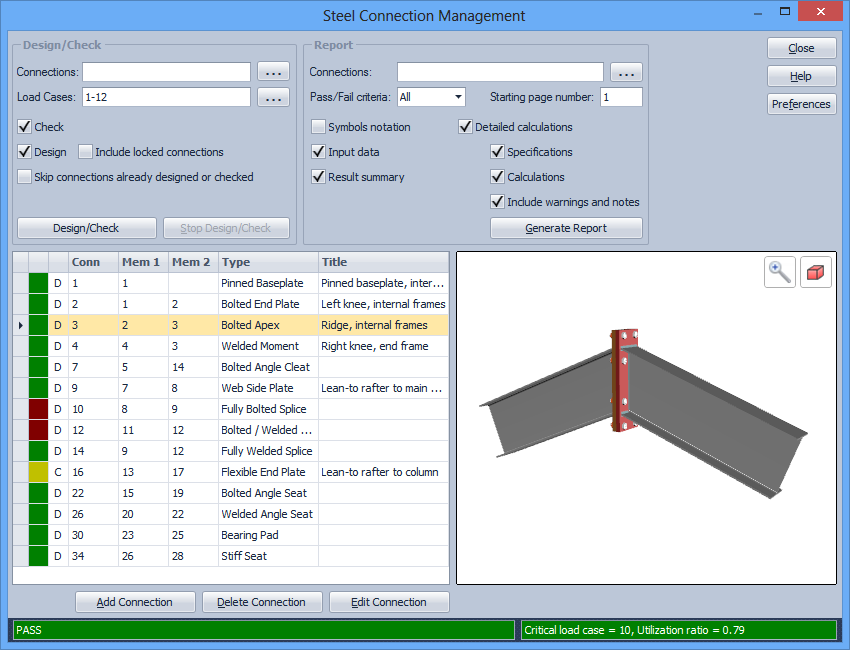
Connection table
You can click on any connection in the table to see it in the connection manager viewer or you can scroll through them by using the up and down arrow keys on your keyboard. You can double-click any connection in the table to open it in the connection editor or alternatively you could use the "Edit Connection" button at the bottom of the table.
The colored blocks in the first column signify whether the connection has passed (green), failed (red), passed with a warning (yellow) or has not yet been designed or checked (white). If the colored block contains a small padlock  then it means that the connection is locked and cannot be designed unless you unlock it first or tick the "Include locked connections" option below when designing in batch mode.
By hovering over the colored block for a particular connection you can obtain its critical load case, utilization ratio, failure mode (if failed) or warning message (if there is one). Note that any of the colors can be changed via the "Preferences" button.
then it means that the connection is locked and cannot be designed unless you unlock it first or tick the "Include locked connections" option below when designing in batch mode.
By hovering over the colored block for a particular connection you can obtain its critical load case, utilization ratio, failure mode (if failed) or warning message (if there is one). Note that any of the colors can be changed via the "Preferences" button.
The second column indicates whether the connection has been design ("D") or checked ("C"). The remaining columns list the members involved in each connection, the connection type and its title.
Connections can be added or deleted by using the "Add Connection" or "Delete Connection" buttons at the bottom. It is recommended that new connections are added by using the procedure explained in "Creating and editing connections" rather than via the "Add Connection" button here.
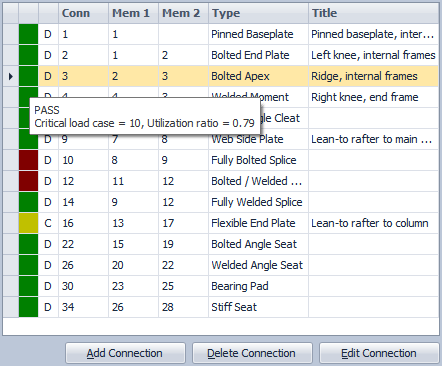
Batch design/check
You can use this section of the manager to design or check all of your connections or just some of them. This will be required from time to time if your model has been changed and/or re-analysed.
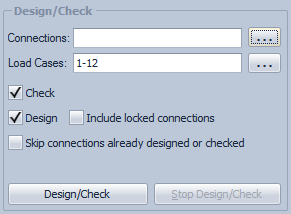
Connections
If you want to design/check all connections then this field should be left blank, otherwise you should type in your desired list of connections (separated by commas or dashes). Alternatively, you can click the "..." button to the right of the input field and then select the connections you want from the list that appears as shown below.
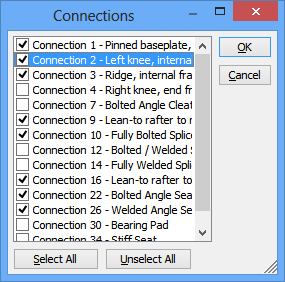
Load cases
If you want to consider all load cases then this field should be left blank, otherwise you should type in your desired list of load cases (separated by commas or dashes). Alternatively, you can click the "..." button to the right of the input field and then select the load cases you want from the list that appears as shown below.
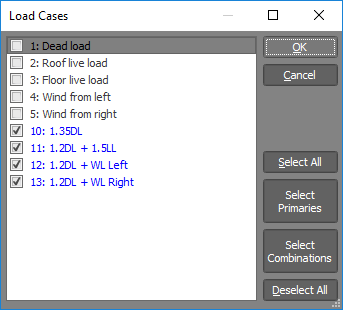
Check
Tick this option if you want the locked connections (marked with  in the first column) to be checked. These are the connections that have been locked manually via the padlock
button or locked automatically due to changes made to them in the connection editor. They will simply be checked for adequacy and none of their components or design parameters will be changed during the check. Note that if the "Design" option is unticked then the locked and unlocked connections will be checked.
in the first column) to be checked. These are the connections that have been locked manually via the padlock
button or locked automatically due to changes made to them in the connection editor. They will simply be checked for adequacy and none of their components or design parameters will be changed during the check. Note that if the "Design" option is unticked then the locked and unlocked connections will be checked.
Design
Tick this option if you want the unlocked connections (not marked with  in the first column) to be designed. During the design some of their components may be changed if
the model or the design actions have changed since the last design.
in the first column) to be designed. During the design some of their components may be changed if
the model or the design actions have changed since the last design.
Include locked connections
If you want to override any locked connections and design them anyway then you should tick this option. During the batch design/check, all the connections encountered that are locked will be designed instead of being checked, however at the end they will be re-locked. Note that any changes you have made to the connection components will be lost during this process.
Skip connections already designed or checked
If you have a large number of connections in your model, you may be able to save some design/check time by ticking this option to skip the ones that have already been designed or checked. For most jobs this time saving will be minimal and so you should generally leave it unticked.
Reports
Text reports for multiple connections can be generated by filling out the following form and then clicking the "Generate Report" button. Alternatively, you can click the "Report" button in the connection editor to obtain a report (including a graphical representation of the connection) for the connection currently in the editor. You can also obtain text reports via the normal SPACE GASS report generator in the non-renderer window. Refer to "Connection reports" for more information.
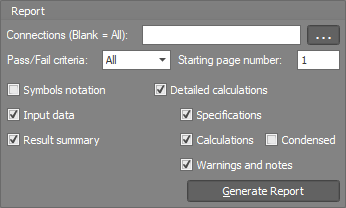
Exporting and importing connections
Connection data can be exported to various file formats including MS-Excel and MS-Access. You can also import from MS-Excel and MS-Access.
To export from the connection table you should select all of the connections to be exported, click the right mouse button, select "Export" and then choose the desired export format. To import, just click the right mouse button and choose "Import".
Note that the data being exported/imported is limited to the connection number, the associated member numbers, the connection type and its title. None of the detailed connection data is included. This means that any changes you have made to a connection will not be included in the exported file and will be lost if you then re-import the file. For designed connections however, once you import the data and re-design the connections, all of the detailed connection data will be reinstated.
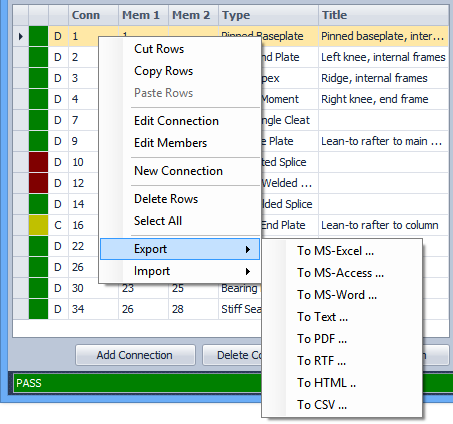
Preferences
The "Preferences" button lets you change various connection parameters and colors. For more information refer to "Connection preferences".